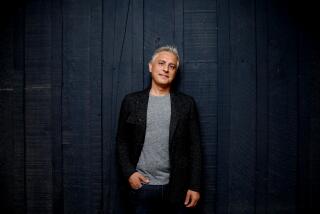War Blazed Imam’s Path to Extremism
- Share via
SWEILEH, Jordan — In the quiet, hillside streets of this middle-class suburb north of Amman, a soft-spoken Palestinian known as Abu Anas Shami settled a decade ago with his wife. He preached at the nearby mosque and taught local children -- including three of his own -- about the ideals of Islam.
Though he was educated at a strict Islamic college in Saudi Arabia and had befriended Islamists known for their radical views, Shami condemned violence in the name of religion and insisted to friends and family that he was a moderate.
But the U.S. invasion of Iraq last year transformed the 35-year-old imam -- whose given name was Omar Yousef Jouma -- from an introspective ideologue into a militant espousing violence.
He abandoned his family and joined the deadly Jamaat al Tawhid wal Jihad network last summer, quickly rising to become spiritual advisor to another Jordanian, Abu Musab Zarqawi, the notorious Al Qaeda associate who is the most wanted man in Iraq. Shami used his Islamic teachings to justify the group’s attacks on U.S. and Iraqi government forces and foreign workers.
Some of those who knew Zarqawi in Jordan say he had a reputation as a troublemaker, and even his mother told an interviewer that he wasn’t smart enough to master logistics or ideology. Shami was very different.
“He was the thinker. He provided their ideology,” said Mohammed abu Rumman, an Islamic scholar and writer in Jordan who knew Shami for more than a decade.
Ten days ago, Shami’s journey appears to have come to a bloody end. He was killed Sept. 17 by a U.S. rocket while traveling down a farm road near Abu Ghraib, west of Baghdad, according to family members and several Islamist websites.
U.S. officials, who had targeted Shami as a top Zarqawi lieutenant, said Saturday that they were still trying to confirm whether the Kuwaiti-born sheik had been killed. They said they had killed nearly 100 Zarqawi supporters over the last month.
“If true, this will be a big blow to [Zarqawi’s] leadership structure,” said a senior U.S. official in Iraq. “He was a key supporter.” In Jordan, Shami’s family and friends can only struggle to understand what drove the sensitive, well-mannered son of a Western-leaning businessman to emerge as a militant who provided spiritual justification for car bombings and suicide attacks, and took up arms against U.S. forces during the siege of Fallouja in April.
“I don’t know what was in my son’s mind,” said Shami’s father, Yousef Jouma, sitting outside the family home last week during a three-day wake for his son. “Nobody knows what happened. He changed. He believed Islam was about love and peace. He taught his children to respect everyone. But he also believed that Americans came to Iraq to kill Muslims, and they had a right to defend themselves.”
Family friends say they were shocked to hear that Shami had joined the Iraq insurgency. “He was a good kid,” said neighbor Issa Mustafa. “He was against killing people. He never even carried a knife.”
Rumman, who has tracked the Islamic fundamentalist movement for years and frequently debated issues with Shami, said the U.S. invasion of Iraq appears to have been the final straw that motivated Shami to take radical action.
“Before, he opposed using violence for political change,” Rumman said, noting that Shami often became so emotional during his sermons that he would choke up with tears. “But after the war, there was a change in his thinking. He became angry. To him, it became a question of honor.”
There are few clues in Shami’s upbringing to explain his extremist turn. His father and mother were forced to flee their homes in the West Bank in the 1960s and 1970s, instilling in their children a sense of political anger against Israel and its key backer, the United States.
But at the same time Shami’s father embraced a modern lifestyle, working as a government accountant in Kuwait and favoring silk ties and dress shirts over traditional Arab garb. Shami’s brothers pursued practical careers as an engineer, taxi driver and merchant. Shami, by contrast, turned to religion at an early age.
“He was always at the mosque,” Jouma recalled.
As a teen Shami began memorizing the Koran and later attended Al Medina Munawara Islamic college in Saudi Arabia.
According to an Islamic website, Shami spent three months in Afghanistan in 1990, learning to use weapons and work with explosives.
His family says they know nothing of such events. They say that in 1991 he married and returned to Jordan, settling in Sweileh, where he was imam at the Murad Mosque.
The family kept a low profile, although Shami began to make contacts in radical Islamist circles, including Abu Mohammed Muqdesy, who has been in and out of Jordanian prisons because of his attacks against Middle Eastern governments, political parties and even public schools, all of which he views as illegitimate.
In 2002, Rumman said, he confronted Shami about his contacts with Muqdesy, but Shami insisted he did not support Muqdesy’s extremist ideas.
Officials in Jordan say there is little evidence that Shami was involved in illegal or antigovernment activities before 2003.
“He wasn’t really seen as a significant figure,” said a Western diplomat in Amman, the capital. “If he were, he would have been rolled up a lot sooner.”
But as the U.S. prepared to invade Iraq, Shami began using his weekly sermons to attack Jordan’s government for siding with the Americans against the Saddam Hussein regime. Since his mosque is across the street from one of the royal palaces, it didn’t take long for the Jordanian secret police to arrest him.
Around the same time, Shami allegedly sought to raise money for Zarqawi and other extremists, according to a recent government indictment.
After he was released by Jordanian officials, Shami told his family he was returning to Saudi Arabia to lecture. But instead, he sneaked into Iraq in August 2003 and joined Zarqawi’s network. It’s unclear when the two first met, but Rumman suspects that Muqdesy provided the link that brought them together.
Through a friend, Shami left word for his wife: If he did not return in three months, she should consider herself divorced, Rumman said. Family members say his wife attempted to follow Shami to Iraq but was turned away at the Syrian border. She has since moved to Egypt with her children.
Soon, Shami’s friends and family were shocked to hear his nasal, rhythmic voice -- once so familiar from his weekly prayers and lectures -- providing chilling narration for militant-produced videotapes of car bombings and suicide attacks.
“There is a hell waiting for you and your soldiers. We will burn you to death,” Shami said during a tape in which Zarqawi’s group claimed credit for the November car bombing of an Italian military base in Nasiriya.
Shami’s taped messages also praised suicide bombers who blew up bridges and a police station in Ramadi.
“Our war is with the traitors and the U.S. bootlickers,” he said in one Internet posting. “We will eat them for lunch before they eat us for dinner.”
Shami’s father can’t bring himself to listen to the tapes. He holds out hope that the voice is not that of his son. “I’m not sure it’s really him on those messages,” Jouma said.
Because of Shami’s religious education, Rumman believes he not only narrated the tapes but was probably the author of many Zarqawi statements and letters. One, the notorious memo allegedly intended for Al Qaeda leaders that was intercepted by U.S. officials earlier this year, calls for increased attacks in Iraq in an attempt to spark a civil war.
“Zarqawi is a simple person,” Rumman said. “He didn’t have the education. That’s why they found [Shami] to be such an important addition. He was a thinker, and they didn’t have that before. He legitimized the things they were doing.”
In Shami’s old neighborhood, he is recalled as a hero. Several hundred people paid their respects to the family during the recent wake.
At the mosque where he once taught, lessons about Islam continue, now with reference to the example he set. During a recent speech after evening prayers, a local sheik held up Shami as an example to a room full of men and boys.
“Nobody forced him to go to Iraq,” said Sheik Abdul Hani Abdul Aziz. “He went because he believed.”
More to Read
Sign up for Essential California
The most important California stories and recommendations in your inbox every morning.
You may occasionally receive promotional content from the Los Angeles Times.













